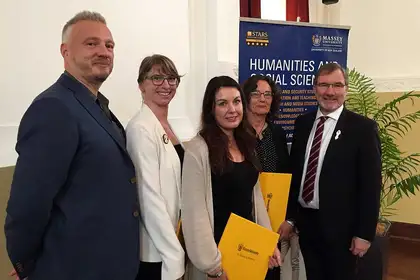
Distinction in Research Awards MC Professor Bill Fish with awardees Dr Emily Beausoleil, Dr Rochelle Stewart-Withers and Professor Christine Stephens, with Pro Vice-Chancellor Distinguished Professor Paul Spoonley.
Health and ageing in Aotearoa, and how to give voice to minorities in politics are the specialist projects of staff recognised at the College of Humanities and Social Sciences’ Distinction in Research Awards this year.
The three awards, presented at a ceremony in the Sir Geoffrey Peren Building last week, were:
- Early Career Award for Distinction in Research: Dr Emily Beausoleil, School of People, Environment and Planning
- Individual Award for Distinction in Research: Professor Christine Stephens, School of Psychology
- Supervisor Award for Distinction in Research: Dr Rochelle Stewart-Withers, School of People, Environment and Planning
Professor Stephens, co-leader of the Health in Ageing Research (HART) team, was awarded for her “outstanding contribution to the field of health psychology and ageing underpinned by research that has had significant national and international influence”.
Her research focuses on longitudinal approaches to studying ageing and on the importance of environment to the health of older people, taking a capabilities approach to wellbeing. Her work has been cited in the World Health Organisation’s new strategy for healthy ageing and this has led to an invitation to write a book for Routledge on new approaches to healthy ageing.
Results of HART studies, which have attracted over $12m in funding, have been shared with over 100 interested organisations and government bodies including Treasury, the Health Promotion Agency, Ministry of Health, Ministry of Social Development and the Families Commission.
Professor Stephens told the audience at the ceremony she is proud of the work by her team, thanking HART co-leader Professor Fiona Alpass. “She is the most generous, team-spirited person. Our role is one – we share it.”
Marginalised voices – who’s listening?
Politics researcher Dr Emily Beausoleil was recognised for her work in contributing to “critical understandings of ways of translating democratic ideals of listening and voice to everyday realities, particularly in diverse and unequal societies”.
In 2016 she was awarded a Marsden Fast Start grant for a project entitled Hearing the difference: new strategies for listening in contemporary politics, which reviewers described as “at the cutting edge of a movement to connect political theory with more robust empirical inquiry”. Seeking to address some of the most pressing challenges facing democracies today – inequality, conflict and civic agency – has also meant she has taken on a more prominent role in the media and professional sectors as a critic and conscience of society, her commendation stated.
Dr Beausoleil described the challenge of her work as finding out “how we meaningfully encounter one another across profound social differences”. She said in her speech she is looking at creative approaches to “finding voice, particularly through the performing arts, by some of the most marginalised communities in order to challenge the views of the dominant groups in society in productive ways”.
She has found that people, generally, are “terrible listeners”, particularly those being asked to listen to views that challenge the status quo when they benefit from things staying as they are.
While there is a lot of talk about the desirability of everyone having a say, being included and being heard, she says there is very little work on “who should be listening to those voices. And why aren’t they listening and can they be encouraged to listen more?”
Mentoring a new generation of Pacific researchers
Dr Stewart-Withers was commended for her excellence as a supervisor and her “deep commitment to developing Pacific students and to growing the Pacific body of knowledge, with students mentioning the ways in which she has challenged them to produce work of the highest possible quality through her passion for their research, her mentoring ability and her patience. They felt valued as researchers, which has stood them in good stead in continuing their work in the Pacific in such diverse fields as coaching rugby, working in the media, and focusing on issues of domestic violence, education, financial literacy and sustainability.”
Since her appointment in 2008, Dr Stewart-Withers has been involved in the supervision of 57 postgraduate students at the PhD and master’s level, many of them Pacific and international students. As primary supervisor, her first doctoral candidate to complete was Paul Beumelburg, for a thesis on education as sustainable development in Mangaia, Cook Islands. The thesis received the Dean’s Award and Dr Beumelburg is now the chief education advisor to the Republic of the Marshall Islands.
Dr Stewart-Withers told the gathering she was “a bit of a latecomer to academia – when after 16 years as a nurse I decided to change careers. I started my PhD here at Massey while working fulltime at MidCentral Health in the mental health senior leadership team. Most of my studies were self-funded. I had a baby midway through and I did fieldwork overseas in a cultural environment different to my own.”
This personal background has given her greater empathy and understanding of the students she supervises, many of whom are parents, working fulltime in professional roles, having to self-fund and do costly overseas fieldwork. Dr Stewart-Withers, who now has five children, says that while student success ultimately lies with the student themselves, and their families, “I believe my guidance, knowledge, skills and overall manner contributes significantly.”
In his introduction speech to the awards, Pro Vice-Chancellor for the College of Humanities and Social Sciences Distinguished Professor Paul Spoonley said he was honoured to acknowledge “our best and brightest”.
“The quality of our research is really important to what we do as a university in the 21st century,” he said.